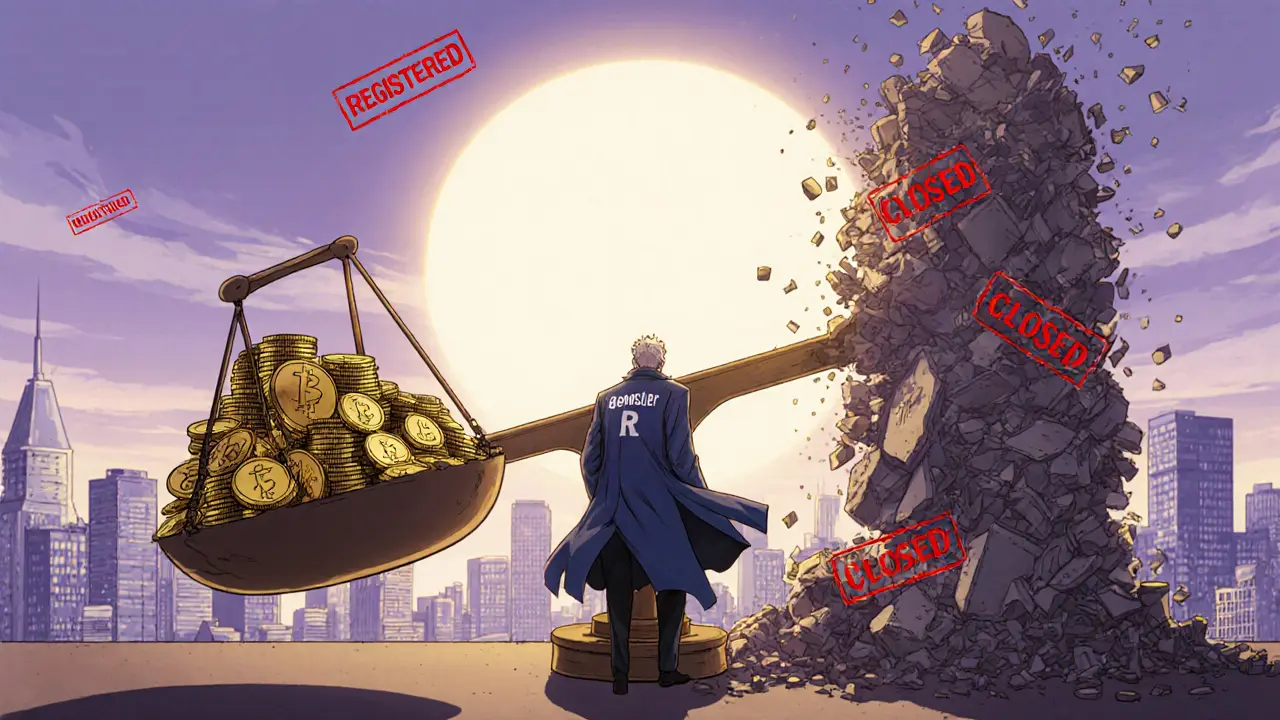SEC Crypto Penalty Calculator
How SEC Penalties Work in 2024
The SEC collected $4.98 billion in crypto penalties in 2024 - a 3,018% increase from 2023's $160 million. Most cases targeted unregistered token sales (62% of enforcement actions) that meet the Howey Test criteria.
Estimated Penalty Analysis
Based on 2024 enforcement data:
- Unregistered token sales: 62% of cases resulted in penalties
- Single case penalty: $4.5 billion (from the article)
- Typical penalty ratio: 100-300% of revenue
Note: This calculator uses 2024 enforcement data from the article. Actual penalties depend on case-specific factors including:
- How well the token meets the Howey Test criteria
- Whether the platform acted as a broker-dealer
- Voluntary cooperation with SEC
- Size of the operation
The SEC hit crypto companies with $4.98 billion in fines in 2024 - a 3,018% jump from the year before. That’s not a typo. One single case alone accounted for $4.5 billion of that total. While the number of enforcement actions actually dropped, the money penalties exploded. This wasn’t just more of the same. It was a strategic, targeted war on unregistered crypto securities, led by the SEC’s final year under Chair Gary Gensler.
Why the Numbers Look Confusing
You might hear different stats. Some say the SEC filed 33 crypto cases in 2024. Others say 49. The truth? It depends on how you count. The SEC brought 25 lawsuits in federal court and 8 administrative cases. That’s 33 total litigated actions. But if you include settled cases before court, the number climbs higher. The real story isn’t in the count - it’s in the cash.In 2023, the SEC collected about $160 million in crypto-related penalties. In 2024? $4.98 billion. That’s a 3,018% increase. Most of that came from one case: the SEC’s win against a major crypto exchange for running an unregistered securities exchange and misleading investors. The court ordered $4.5 billion in disgorgement, interest, and penalties. That one judgment alone made 2024 the most expensive year in crypto enforcement history.
What the SEC Was Really Targeting
The SEC didn’t go after every crypto company. They went after the ones that sold tokens as investments without registering them as securities. Sixty-two percent of their 2024 cases involved unregistered token sales - mostly ICOs and token launches that promised profits based on the efforts of others. That’s the Howey Test in action: if it looks like an investment contract, the SEC treats it like one.They also cracked down on crypto platforms that acted like broker-dealers without licenses. That includes exchanges that let users trade tokens, earn interest on crypto deposits, or stake assets for rewards. If the platform is taking a cut or managing the investment, the SEC says it’s a securities business - and needs to register.
One big example: a DeFi lending platform settled in Q4 2024 for $120 million. The SEC found they were offering interest-bearing accounts that functioned like unregistered securities. Users weren’t just lending crypto - they were investing in a profit scheme run by the platform. That’s exactly what the SEC says is illegal without registration.
Why the Number of Cases Went Down
Despite the huge fines, the SEC filed fewer crypto cases in 2024 than in 2023. Why? Because they stopped chasing small players. They went after the big ones - the ones with the most money, the most users, and the most impact. One case could bring in billions. Ten small cases might bring in $50 million. The math is clear: go big or go home.Half of all 2024 crypto enforcement actions happened in September and October. That’s no accident. The SEC knew the political clock was ticking. Chair Gensler announced he’d leave when the new administration took over. They rushed to secure major judgments before the leadership changed. That’s why the fines spiked - it was a final push to set legal precedent.

The Human Side: Whistleblowers and Staff Surge
The SEC didn’t do this alone. Their Crypto Assets and Cyber Unit grew by 20% in 2024. They hired more lawyers, forensic accountants, and blockchain analysts. Why? Because crypto investigations are complex. Tracking token flows, tracing wallets, and proving intent takes time and skill.They also got 180 tips from whistleblowers - up 25% from 2023. People inside crypto companies started talking. Why? Because the SEC’s whistleblower program paid out $345 million to victims in 2024, even though that’s down from $930 million the year before. That’s because most of the $4.98 billion in fines went to the government, not to investors. But the threat of big payouts kept insiders coming forward.
Settlements, Not Trials
Most crypto cases didn’t go to trial. About 44% ended in settlements. Companies agreed to pay fines, shut down illegal services, and accept court orders - all without admitting guilt. Why? Because trials are expensive and risky. Even if a company thinks it’s right, the cost of fighting the SEC can be worse than paying up.But when the SEC did go to trial, they won. The $4.5 billion judgment was a trial win. That’s huge. It tells every crypto company: if you’re selling tokens as investments, you’re playing with fire. The SEC has the legal tools, the evidence, and the court backing to crush you.

What Happens Next?
Gensler is leaving. The Trump administration is coming in. Experts expect some shift in tone - maybe less aggressive, maybe more focused on regulation than punishment. But the legal foundation is already laid. Courts have now ruled multiple times that many crypto tokens are securities. That won’t disappear with a new chair.For crypto firms, the message is clear: register or get fined. If you’re running a platform that lets users earn yield, trade tokens, or stake assets, you’re likely operating as a securities business. No gray area. No loopholes. The SEC isn’t bluffing.
Investors, too, need to pay attention. If a project promises high returns with little risk, it’s probably a security. And if it’s not registered, it’s illegal. The SEC’s 2024 crackdown wasn’t about killing crypto. It was about forcing it to play by the same rules as Wall Street. Whether you like it or not, that’s the new reality.
Key Takeaways
- The SEC collected $4.98 billion in crypto fines in 2024 - up 3,018% from 2023.
- One single case accounted for $4.5 billion of that total.
- 62% of enforcement actions targeted unregistered token sales under the Howey Test.
- DeFi platforms, exchanges, and lending services were the main targets.
- Enforcement actions dropped, but penalties soared - the SEC went for big wins.
- Whistleblower tips rose 25%, and the SEC’s crypto unit grew by 20%.
- Most cases settled, but the SEC won its biggest trial, setting a legal precedent.
- Registration is no longer optional for crypto platforms offering investment-like products.
Why did SEC crypto fines go up so much in 2024?
The spike came from one massive $4.5 billion judgment against a major crypto exchange for running an unregistered securities exchange. Combined with other large settlements, total penalties jumped from $160 million in 2023 to $4.98 billion in 2024 - a 3,018% increase. The SEC shifted strategy: fewer cases, but far heavier penalties to set legal precedent before leadership changed.
Did the SEC file more crypto cases in 2024?
No. The SEC filed fewer crypto enforcement actions in 2024 than in 2023 - around 33 litigated cases, down from 42. But they focused on the biggest players. Instead of chasing dozens of small cases, they went after companies with the most money and users. One case delivered nearly all the fines, making the total penalty amount explode even as case numbers fell.
What kind of crypto projects did the SEC target?
The SEC went after projects that sold tokens as investments without registering them as securities. That includes ICOs, token sales promising returns, DeFi lending platforms offering interest, and exchanges letting users trade or stake tokens. If the platform manages the investment or profits depend on their efforts, the SEC says it’s a security - and must be registered.
Is the SEC done with crypto enforcement?
No. Even though Chair Gensler is leaving, the legal precedents from 2024 are already in place. Courts have now ruled multiple times that many crypto tokens are securities. The next SEC chair may tone down the rhetoric, but the rules won’t disappear. Crypto companies still need to register or face massive penalties.
How can a crypto project avoid SEC fines?
Register as a securities issuer if you’re selling tokens as investments. Or structure your token so it doesn’t meet the Howey Test - meaning users aren’t investing money expecting profits from others’ efforts. Avoid offering interest on deposits, staking rewards tied to platform performance, or trading features that act like a stock exchange. If you’re unsure, consult a securities lawyer before launch.

taliyah trice
November 22, 2025 AT 09:10So they hit one exchange with $4.5B? That’s wild. I mean, I get they want to protect people, but that’s like fining a single bakery for all the bread fraud in the country. Feels a bit off.
Still, if you’re selling something that acts like a stock, yeah, you gotta register. Simple.
But man, the timing? Right before Gensler leaves? Feels political.
Not saying it’s wrong, just… feels rushed.
Charan Kumar
November 24, 2025 AT 04:30USA always play big game no matter what
in India we see small guys get crushed by rules but big ones walk free
crypto is new but rules are old
why punish innovation just because it dont fit 1930s law
they want control not fairness
Peter Mendola
November 25, 2025 AT 02:213,018% increase? Not surprising. The SEC has been signaling this for 18 months. The $4.5B judgment was the culmination of a meticulously built legal strategy.
Case law now firmly establishes that most utility tokens fail the Howey Test.
Compliance is not optional. It is existential.
Investors who ignored this are not victims-they were negligent.
📉 #SECWins
neil stevenson
November 26, 2025 AT 01:21Bro the SEC didn’t go after crypto… they went after the people who lied to you and took your money.
Remember when you heard ‘10x your crypto in 30 days’? Yeah… that was a security.
They finally got the big ones.
Now the real ones can breathe.
👏👏👏
Samantha bambi
November 26, 2025 AT 06:10It’s interesting how the narrative shifts depending on who you ask.
Some say it’s overreach. Others say it’s overdue.
The fact that 62% of cases involved unregistered token sales tells me the industry knew the rules and chose to ignore them.
It’s not about killing innovation-it’s about ensuring that innovation doesn’t come at the cost of investor protection.
And honestly? That’s a fair trade.
Anthony Demarco
November 27, 2025 AT 20:14USA thinks it owns the world now
SEC thinks they can dictate crypto rules to everyone
what about EU what about India what about China
you think you can force your laws on global tech
you think crypto is your playground
it’s not your money it’s not your tech
you’re just scared of decentralization
you’re scared of losing control
and now you’re screaming because you can’t stop it anymore
Jack Richter
November 29, 2025 AT 09:32Yeah so what. Big fines. Whatever.
Still waiting for someone to explain why this matters to me personally.
sky 168
December 1, 2025 AT 05:21One big fine doesn’t mean the system works.
It just means one company got unlucky.
What about the next 100? Are they all gonna be crushed too?
Or is this just theater?
jack leon
December 2, 2025 AT 16:58THEY DIDN’T JUST FINE THEM - THEY ERASED THEM.
That $4.5B? That’s not a penalty. That’s a funeral.
They didn’t just take money-they took legacy.
And now every founder is looking over their shoulder.
This isn’t regulation.
This is a warning shot fired across the bow of an entire industry.
WE’RE LIVING IN A NEW ERA.
And the old crypto dream? It’s dead.
Long live regulated crypto.
Chris G
December 3, 2025 AT 13:36Howey Test is the only thing that matters
if you promise returns its a security
no debate
if you think otherwise you dont understand law
case closed
Phil Taylor
December 5, 2025 AT 06:52Let’s be honest - the SEC is just a tool of Wall Street.
They don’t care about investors.
They care about protecting banks.
Crypto threatened their monopoly.
So they weaponized the law.
And now they’re pretending they’re heroes.
Pathetic.
diljit singh
December 5, 2025 AT 08:39Indian crypto guys got banned for $5000
US exchange gets fined $4.5B
so the real crime was being rich
not breaking rules
the SEC doesn’t want fair
they want dominance
and you all clap like trained dogs
Abhishek Anand
December 6, 2025 AT 05:52What we’re witnessing isn’t enforcement - it’s the death rattle of centralized authority.
The SEC doesn’t understand blockchain.
They see tokens as stocks because they lack the conceptual framework to see anything else.
This is the last gasp of a 20th-century regulatory model trying to hold back a 21st-century revolution.
History will not remember them as protectors.
It will remember them as relics.
And the market? It will adapt.
Always does.
vinay kumar
December 7, 2025 AT 21:57they just want money
they dont care about investors
they care about their budget
look at the whistleblower payouts
they dropped from 900M to 345M
so its not about justice
its about filling the treasury
Lara Ross
December 9, 2025 AT 07:54As a former compliance officer at a fintech firm, I can confirm: the SEC’s approach is not only legally sound - it’s ethically necessary.
Investors deserve transparency. Platforms deserve clarity.
Registration is not a burden - it’s a badge of legitimacy.
Those who resist are not innovators.
They are opportunists.
And the market will reward those who play by the rules.
Long-term, this is a win for everyone.
Leisa Mason
December 9, 2025 AT 20:51Wow. So the SEC finally found a way to make crypto look like a scam.
Brilliant PR move.
Now the public thinks all crypto = fraud.
Meanwhile, the real frauds - the banks, the hedge funds, the insider traders - still get bailouts.
But hey, at least they got their $4.98B.
Congratulations. You won the game.
And lost the war.
Lani Manalansan
December 11, 2025 AT 03:45It’s funny how people call this ‘crackdown’ when it’s really just enforcement.
Like, if you open a bank, you need a license.
If you run a stock exchange, you need a license.
Why should crypto be different?
It’s not about killing innovation.
It’s about making sure innovation doesn’t hurt people.
That’s not evil.
That’s basic responsibility.
LaTanya Orr
December 12, 2025 AT 20:27There’s a deeper question here.
Who defines what a security is?
Is it a judge? A regulator? Or is it the people who buy and use the product?
Maybe the real issue isn’t the SEC’s power.
Maybe it’s that our legal system hasn’t caught up with how value is created today.
We’re trying to fit a quantum concept into a Newtonian framework.
And that’s why it feels so broken.
Ashley Finlert
December 13, 2025 AT 21:58This moment is historic.
Not because of the dollar figures.
But because it marks the moment crypto stopped being a fringe experiment - and became part of the financial mainstream.
The SEC didn’t kill crypto.
They baptized it.
Now it has to wear a suit.
And honestly?
It needed to.
Because the wild west was never sustainable.
Now the real builders can finally thrive.
Chris Popovec
December 15, 2025 AT 04:24They’re using the SEC as a front for a central bank takeover.
They’re not enforcing laws.
They’re building a digital surveillance state.
Every wallet, every transaction, every token - now tracked.
And you think this is about investor protection?
No.
This is about control.
They want your money. They want your data.
And they want you to thank them for it.
Wake up.
This isn’t regulation.
This is fascism with a compliance checklist.
Marilyn Manriquez
December 15, 2025 AT 20:54As a long-time supporter of decentralized finance, I was skeptical.
But after reading this breakdown, I see it differently.
The SEC didn’t target innovation.
They targeted deception.
And that’s not the enemy of crypto.
It’s its greatest ally.
Because the only way crypto survives long-term is if it earns trust.
And trust comes from transparency.
Not from loopholes.
Thank you, SEC, for forcing the industry to grow up.
taliyah trice
December 17, 2025 AT 02:39Wait… I just realized something.
That $4.5B fine? Most of it probably won’t even be collected.
That exchange is probably bankrupt already.
So the SEC didn’t get the money.
They just made a statement.
And now everyone’s scared.
Which… maybe was the whole point.